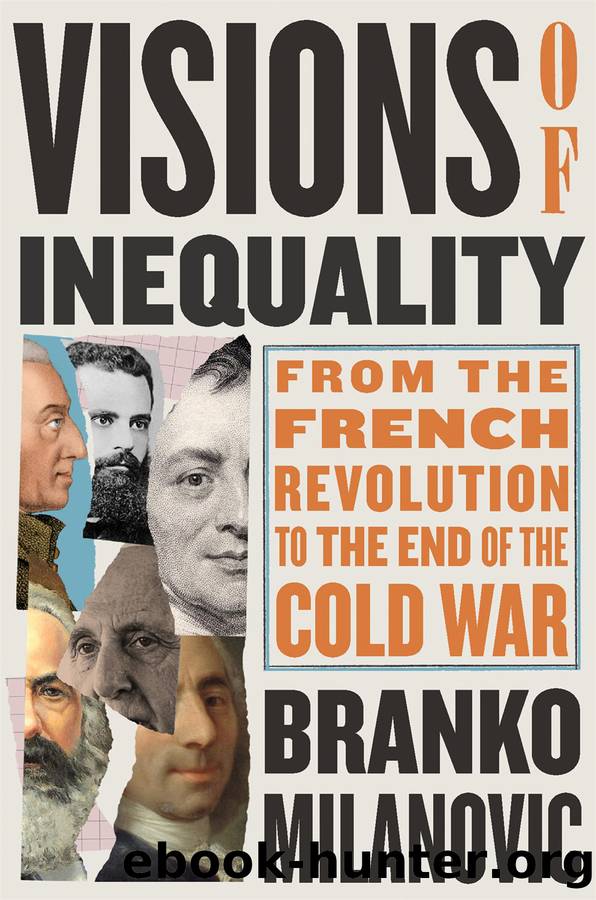Visions of Inequality by Branko Milanovic

Author:Branko Milanovic
Language: eng
Format: epub
Publisher: Harvard University Press
The Kuznets hypothesis represented a very stylized picture of the evolution of income inequality; it was a mix of, as Kuznets said, âperhaps 5 per cent empirical information and 95 per cent speculation, some of it possibly tainted by wishful thinking.â 22 In his original formulation of it, Kuznets cited the supporting experience of only six countries: the UK, the United States, and Germany, with their fragmentary long-term data going back to the nineteenth century, and India, Sri Lanka, and the Philippines, with one observation each from the early 1950s. Yet the appeal of the hypothesis was manifold: it provided an empirically testable story regarding the evolution of income distribution as economies develop; it maintained the âconversationâ with classical writers in allowing for a âtendency of the rate of profit to fallâ; and it broadly fitted patterns observed in the rising industrial powers. Moreover, it seemed that this pattern might be repeated among the developing countries, including Japan, Turkey, Brazil, and South Korea, as they followed the path charted by more advanced Western countries. It was an explanation of economic history and a forecast of the movement of inequality in the future. Its weakest point was its assumption of relatively equal distribution predating the industrial takeoff. But, as we have seen, in some cases even that assumption could be defended.
The hypothesis did have a precursor, although not from economics. When Alexis de Tocqueville published his Memoir on Pauperism in 1835, 120 years before Kuznets enounced his hypothesis, he made the same point:
If one looks closely at what has happened to the world since the beginning of societies, it is easy to see that equality is prevalent only at the historical poles of civilization. Savages are equal because they are equally weak and ignorant. Very civilized men can all become equal because they all have at their disposal similar means of attaining comfort and happiness. Between these two extremes is found inequality of conditions, wealth, knowledgeâthe power of the few, the poverty, ignorance, and weakness of all the rest. 23
Download
This site does not store any files on its server. We only index and link to content provided by other sites. Please contact the content providers to delete copyright contents if any and email us, we'll remove relevant links or contents immediately.
International Integration of the Brazilian Economy by Elias C. Grivoyannis(109615)
The Radium Girls by Kate Moore(12014)
Turbulence by E. J. Noyes(8040)
Nudge - Improving Decisions about Health, Wealth, and Happiness by Thaler Sunstein(7689)
The Black Swan by Nassim Nicholas Taleb(7106)
Rich Dad Poor Dad by Robert T. Kiyosaki(6603)
Pioneering Portfolio Management by David F. Swensen(6288)
Man-made Catastrophes and Risk Information Concealment by Dmitry Chernov & Didier Sornette(6002)
Zero to One by Peter Thiel(5786)
Secrecy World by Jake Bernstein(4740)
Millionaire: The Philanderer, Gambler, and Duelist Who Invented Modern Finance by Janet Gleeson(4464)
The Age of Surveillance Capitalism by Shoshana Zuboff(4274)
Skin in the Game by Nassim Nicholas Taleb(4235)
The Money Culture by Michael Lewis(4196)
Bullshit Jobs by David Graeber(4179)
Skin in the Game: Hidden Asymmetries in Daily Life by Nassim Nicholas Taleb(3987)
The Dhandho Investor by Mohnish Pabrai(3758)
The Wisdom of Finance by Mihir Desai(3728)
Blockchain Basics by Daniel Drescher(3574)
